The first recipients of the COVID-19 vaccine will be frontline health care workers and elderly people living in nursing homes. | Shutterstock
The first recipients of the COVID-19 vaccine will be frontline health care workers and elderly people living in nursing homes. | Shutterstock
While the long-anticipated end of the COVID-19 pandemic does not yet have a scheduled date, many medical and health care professionals see the recently rolled-out coronavirus vaccine as one more step in the right direction.
The question of how the vaccine should be best distributed and who should be prioritized is one that has received a variety of answers from the medical field and the public.
Jeffrey Byrnes, an assistant professor of philosophy and medical ethicist at Grand Valley State University, has some answers to share, which he provided in a Dec. 21 interview with Bridge Michigan.
Byrnes, a PhD graduate from the University of Essex in U.K., feels that scarce COVID-19 vaccine supplies should be maximized until there is enough to go around.
"Given that we cannot vaccinate everyone at once, how do we allocate the first doses to get maximal benefit to all the people?" Byrnes asked Bridge Michigan. He feels that those who control vaccine distribution should promote justice and equity, as well as a sense of public trust. "How do we administer this vaccine in a way that both treats people fairly and ensures an equitable result?"
Byrnes acknowledge that Michigan's minority populations may be uncertain or skeptical of the vaccine. "When the state’s minority populations have had time to review the evidence and have seen the vaccine in their communities, then they can choose to be vaccinated if they feel comfortable doing so," he said, according to Bridge Michigan.
Byrnes feels the state should be prepared to distribute the vaccine as widely across Michigan as possible and pay extra attention to communities that may lack, or be distanced from, health care delivery systems.
If there were enough of the COVID-19 vaccine to distribute it to all members of the public no matter their profession or other demographic information, the obvious answer would be to offer a dose to everyone; however, in the current situation of limited supply, Byrnes said that officials have difficult decisions to make about distribution.
He explained that many of the factors behind choosing to vaccinate, for example, a teacher over a power line worker are situational and complex, bringing in opinions from the fields of ethics, data science and statistics.
"There are some important empirical questions that flesh out the ethical principles," Byrnes told Bridge Michigan. "These are difficult questions that have local variation. Firefighters might have a greater utility in central California than they do in southern Louisiana."
Byrnes said that, as long as the vaccine is proven to be safe and effective and one can receive it in a safe environment, members of the public have a moral duty to be vaccinated. "The list of things that one should do is longer than the list of things that the government can and should compel one to do," he said, according to Bridge Michigan.


 Alerts Sign-up
Alerts Sign-up